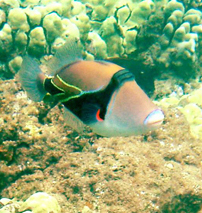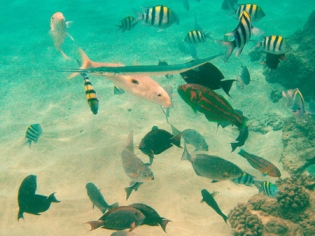Natural vastness inspires, but it rarely results in an intimate togetherness with God. The rapture we feel standing before the Grand Canyon is more likely to erupt in a shout than in a conversation. The soaring galaxies are more prone to cause us to take our eyes from heaven and ask, “Father, are you there?” The best answers never come from beyond us. Why? Because God best declares himself from within us.
God becomes visible to those who look for him in the right place. Therefore, no eye—no literal eye—can see him! No ear can hear him! No mind can conceive him! He hides his vastness only in the deepest dimensions of our inner existence.
The world around us is the world of “outer” relationships. In such outer places we make friends, achieve success—get on in the world! In this busy, worried world we have appointments, face disappointments, and force our ego-driven souls to stab at achieving power. On the surface of our lives, things frenzied and dyspeptic dominate us. But in our hearts it is quite another matter.
First Corinthians 2:10 contains one little word that lunges at us with challenge: “But God has revealed it to us by his Spirit. The Spirit searches all things, even the deep things of God.”
The apostle used the word bathos for “deep” here. This is the symbol that I want to keep central in this book.
Deep is the dwelling place of God. Deep is the character of the ocean. Hold the metaphor for a moment and savor its lesson ahead of time. For deep is where the noisy, trashy surface of the ocean gets quiet and serene. No sound breaks the awesome silence of the ocean’s heart. Most Christians, however, spend their lives being whipped tumultuously through the surface circumstances of their days. Their frothy lifestyles mark the surface nature of their lives. Yet those who plumb the deep things of God discover true peace for the first time.
Deep is the gift of discipline. Bathos is a word I really discovered at the Great Barrier Reef. Like all visitors to the Reef, I was at first overwhelmed by the odd sensation of standing up—only ankle deep—seventy or ninety miles out in the middle of the ocean. It was for me the odd sensation that Peter must have felt when he walked on the Sea of Galilee.
Bathos is a word I really discovered at the Great Barrier Reef. Like all visitors to the Reef, I was at first overwhelmed by the odd sensation of standing up—only ankle deep—seventy or ninety miles out in the middle of the ocean. It was for me the odd sensation that Peter must have felt when he walked on the Sea of Galilee.
But once my “ankle-deep wonder” had passed, I remembered why I had made the trip. I was with my wife and son. My son had come to scuba dive while my wife and I snorkeled. Snorkeling is a pastime more than a sport. For while my son plunged deeply beneath clear waters to bury himself in the wonder of the mysterious ocean depths, my wife and I, wearing masks, only floated on the surface facedown.
In some ways what we were all seeing looked the same. But my wife and I literally sunburned our backs in our surface study of the reef, while our son plumbed its wonders.
There were other differences in the day. Our son had spent many years learning to go deep. Deep requires years of practice. Deep cannot be achieved instantly upon the first dive. The equalizing of pressure in the head and facial sinuses must be developed gradually, for going deep can be dangerous, even fatal. What amazes me most is what we reported upon returning from the Great Barrier Reef. Ask me if I’ve been there, and I will hastily answer yes. So will my son. However, the truth is that the content of our experience was greatly different. We will both spend the rest of our lives talking about that experience and our enthusiasm will always be exuberant. But only our son really knew the Reef; only he understood the issue of depth.
What amazes me most is what we reported upon returning from the Great Barrier Reef. Ask me if I’ve been there, and I will hastily answer yes. So will my son. However, the truth is that the content of our experience was greatly different. We will both spend the rest of our lives talking about that experience and our enthusiasm will always be exuberant. But only our son really knew the Reef; only he understood the issue of depth.
Abraham Maslow conceptualized the pyramid of priorities. Only a few people, he said, ever become self-actualized. Only a few know who they are and live life to the fullest extent. Only a few live adjusted lives at the peak of his pyramid. In fact, Maslow said the whole world is comprised of non-peakers talking to non-peakers about peak experiences. In some ways it seems to me that much of Christianity is a conversation of snorkelers talking to each other of scuba experiences. If mere conversation or study groups were the path to depth experiences, the church would be deep indeed. But it is those who read and pray, not those who philosophize and chatter, who arrive at lives of real power.
The issue is going deep. Deep reveals the reality of God. Yet the snorkelers can use the language of divers, for the metaphors pass close. But they are not the same.
Excerpted from Calvin Miller’s book Into the Depths of God. Pictures by Randy Alcorn




